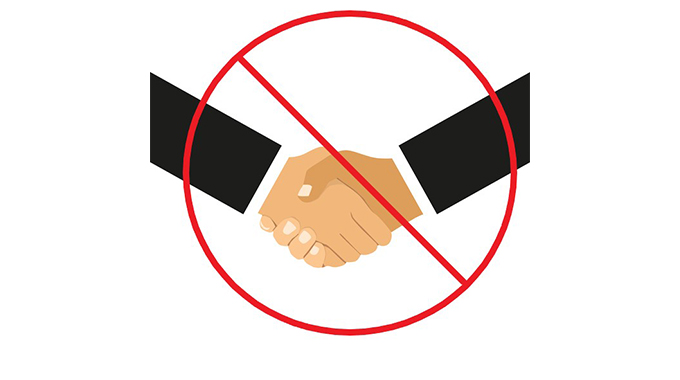Writing Covid-19: Distortions to the usual styles of expressing greetings and congratulatory messages

Pathisa Nyathi
Greetings are an integral part of African culture and more so when individuals meet after a long period of separation. “Sakubona!” This is the word uttered when individuals meet.
Hardly would even strangers merely gaze each other and pass without some form of verbal greeting. Of course a lot of long-held African rituals and ways of life are beginning to fall apart, with the cities being the celebrated cemeteries of African culture. The situation is exacerbated by mouths that are continually concealed from public view, all in the name of curtailing the spread of the crowned coronavirus. Combined with blocked noses makes it easier for people in the said cemeteries to pass without a feeble sound by way of greeting. At best what croaks through the cloth is, “Salibonani,” the adopted version of “Sakubona.” Some will allow this to pass as some acquired plural of respect to justify something that has corrupted IsiNdebele.
For individuals that long parted verbal pronouncements came after something more intimate, something more emotional and warmer. Sometimes tears flowed out of welling eyes as icing on the cake of joy, delight and excitement. The arms of the two entangled their bodies, octopus style. In that octopian embrace there was shaking and swaying of their bodies as if in some tug of love.
Literally, this is ukuthandana and is expressed in hut architecture. A hut roof has slim wooden poles known as imithando. In some way these entangle or embrace intungo, whose name comes from ukuthunga, meaning to go through as during piercing through something. A woman who is coiling an ilala basket is said uyathunga ingcebethu. Actually, what ‘thungas’ is an awl, usungulo, a sharpened thin and cylindrical piece of metal. It pierces right through and that is the correct meaning of “ukuthunga.” A soldier will equally use a long-bladed spear to “thunga” an opponent. Here, once again, the idea is that the blade has gone through the body of the victim. “Ngizakuthunga ngomkhonto!”
Ukuthanda umuntu happens at two levels. There is literal ukuthanda, getting entangled or embracing, and almost fusing or melting into each other. In a figurative sense ukuthanda means to love. Oh how we miss the lessons that we used to conduct at Amagugu Cultural Centre. We certainly have to find new strategies to circumvent the coronavirus so we share our knowledge with school pupils, children and adults alike. Grandmothers used to get hold of their grandchildren hands, bring them closer their love-moistened mouths. They succulently kissed (ukuqabuja) the outside parts the grandchildren’ hands. That was restricted to the young ones. Among the adults embraces and handshakes were the common cultural expressions. Through them love, emotion and warmth were expressed. Come Coronavirus! What had been time-honoured practices for expressing love, joy, emotion and warmth have been abandoned against the campaign to curtail the wild spread of the hungry coronavirus that respects no culture.
If anything, it takes advantage of cultural practices that bring people together or for some reason or other become intimate especially in the erotic sense. That is how the coronavirus loves to spread its progeny among Have you ever come across a situation where a wife has contracted the coronavirus and the husband in uninfected? I am aware of several couples that were both reeling from the effects of Covid-19.
Last Friday we gathered at the National Gallery Zimbabwe (NGZ) in Bulawayo to witness the Bulawayo-based arts, culture and heritage legends receive their trophies during a function that was graced by the Indian Ambassador to Zimbabwe, Vijay Khandufi. Also present was Deputy Minister Raji Modi. The Director of the National Arts Council of Zimbabwe (NACZ) Nicholas Moyo hosted the Guest of Honour.
Director of the National Gallery of Zimbabwe in Bulawayo, Butholezwe Nyathi was Director of Ceremonies in a brief and lighthearted ceremony. I was one of the recipients, but doing much more than merely receiving a trophy. I was observing how Covid-19 is impacting our traditional culture.
When the recipients of the well-designed trophies were receiving their silverware, there was no handshaking. In normal circumstances there would have been warm handshakes and indeed, in some instances, body embraces. Covid-19 has militated against standard forms of expressing congratulatory messages and gestures. For fear of contracting the coronavirus and risking undertaking premature one-way travel to the world of angels, we have no choice but to oblige.
I observed too that when people met they used clenched fists with their knuckles doing what one may term some cursory or disinterested engagement. Very cold indeed. It’s not the usual expressions of emotional warmth, intimacy, love or something in that domain. A generation of young people characterised by cold and dry greetings is being groomed and nurtured.
I also observed some who were extending their arms to achieve the same result. It was done in such a way that the covered parts of their arms reached for each other. Warm flesh to hot flesh was avoided as if the coronavirus has the habit of shunning cotton and similar materials. And besides, the greetings, particularly when they are warm, they are accompanied by broad and life-filled and infectious smiles with teeth baring their welcoming and responding white. Lips draw back in the process to give a chance to the teeth to complement handshakes or warm embraces.
Who can see through a pampered mouth? Who can see the smiling teeth behind the thick layers of oral pampers? How are we to express pleasure, love and congratulatory messages with our mouths open shut? Maye ngekhorona! Oh how we miss the days when we expressed ourselves fully and unashamedly as Africans pursuing ages-old ways of expressing ourselves!










Comments